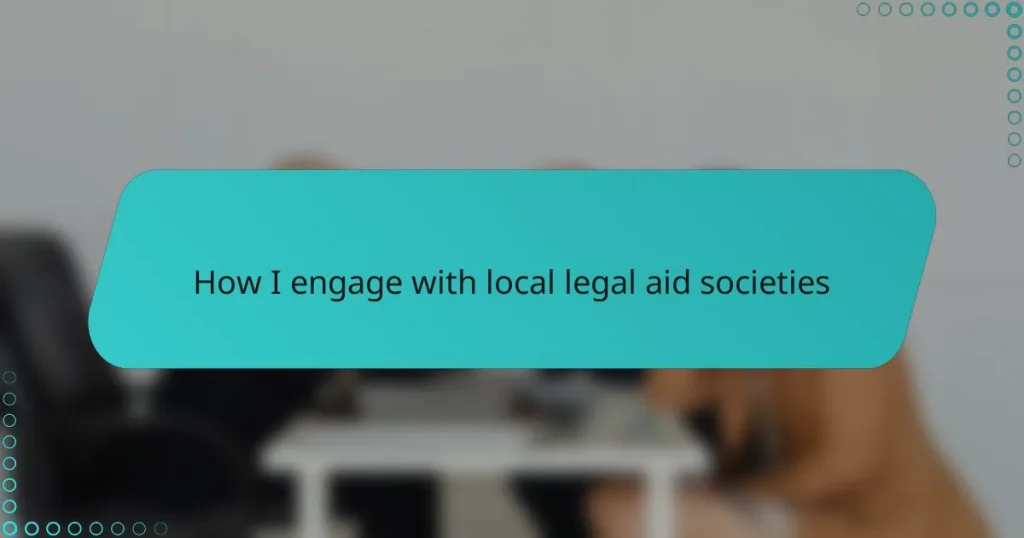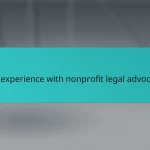Key takeaways
- Legal aid societies empower individuals by providing legal assistance and support, fostering confidence and community trust.
- Effective legal advocacy involves clear communication, active listening, and thorough preparation, enhancing the client’s experience and outcomes.
- Sharing personal experiences with legal aid can help break stigma and encourage broader access to justice for all individuals.
- Participating in community events and building relationships with legal advocates can open doors to much-needed legal resources.
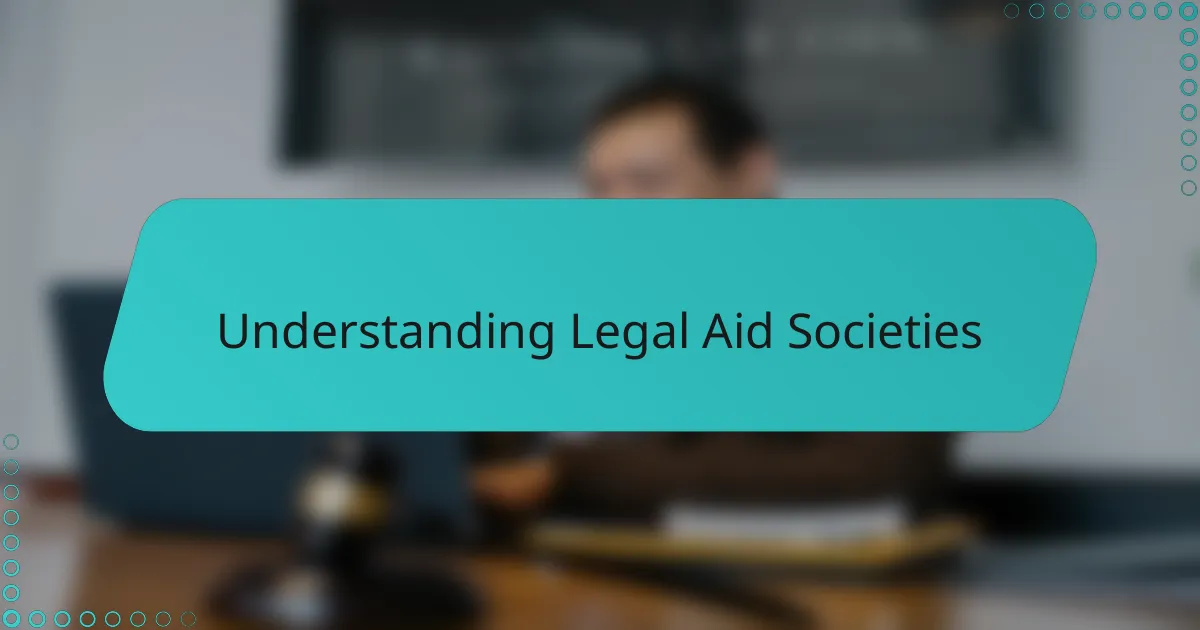
Understanding Legal Aid Societies
Legal aid societies are more than just organizations; to me, they embody gateways to justice for people who might otherwise feel lost in the legal maze. Have you ever considered how daunting it must be for someone facing a legal issue without the resources to hire a lawyer? That’s the reality these societies strive to change every day.
When I first started working with a local legal aid society, I was struck by their commitment—not just in providing legal assistance but in empowering clients with knowledge and hope. It’s not just about cases and statutes; it’s about real people’s lives and the kind of impact that authentic support can make.
I often wonder how many stories remain untold because people don’t know these resources exist. Understanding what legal aid societies do opens our eyes to a crucial piece of the justice system that operates quietly but powerfully behind the scenes.
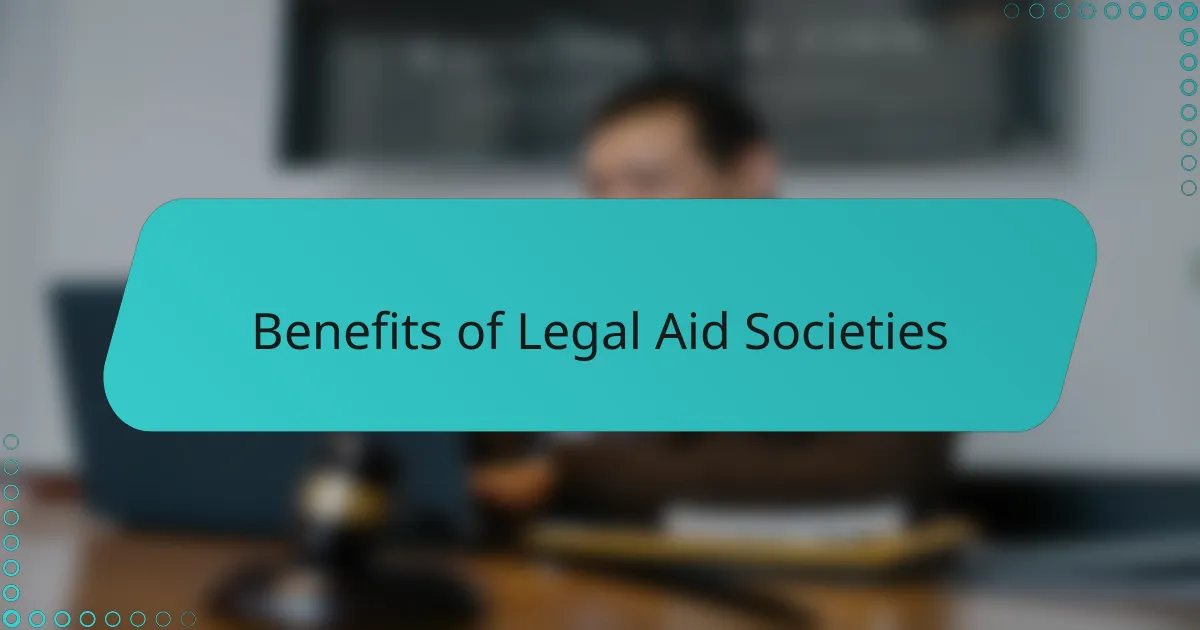
Benefits of Legal Aid Societies
What really stands out to me about legal aid societies is how they level the playing field. I’ve seen firsthand how someone who felt overwhelmed and powerless can gain confidence simply by having expert guidance at their side. Isn’t that the kind of help everyone deserves when facing complex legal issues?
Another benefit I appreciate deeply is their ability to build community trust. Over time, I noticed that clients didn’t just get legal advice—they found a safe space where their voices mattered. That feeling of being heard can make all the difference when navigating the stressful world of law.
Lastly, legal aid societies offer more than immediate solutions; they plant seeds for long-term change. By addressing root causes and educating individuals about their rights, they help break cycles of injustice. From my experience, this ripple effect is what makes their work truly invaluable.
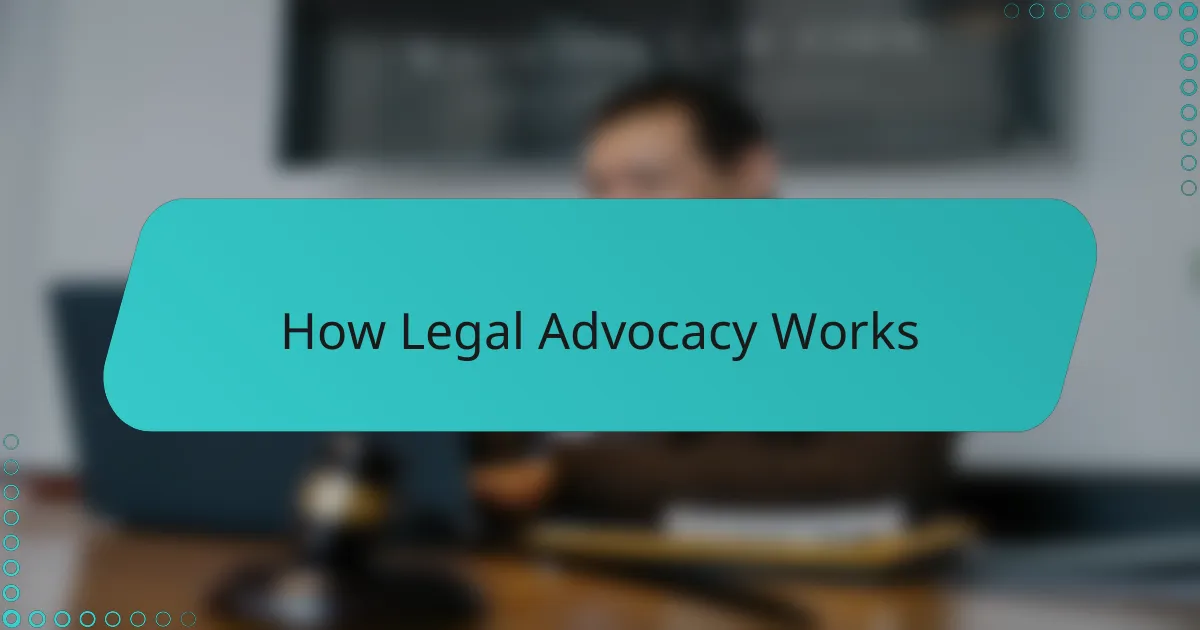
How Legal Advocacy Works
Legal advocacy works by connecting people with the legal knowledge and representation they often can’t access on their own. I’ve seen how advocates break down complicated laws into everyday language, which immediately eases a client’s anxiety and makes the process feel less intimidating. Isn’t it amazing how much power just understanding your rights can give you?
In my experience, legal advocacy doesn’t stop at winning cases—it’s about standing alongside individuals as they navigate uncertainty. When I volunteered with a legal aid society, I noticed how advocates listen closely, not just to prepare arguments but to truly understand what’s at stake in someone’s life. That kind of empathy transforms the whole experience.
What I find most compelling is how legal advocacy tackles systemic issues by supporting clients in ways that ripple out into the community. Each case can set a precedent or raise awareness, and I’ve witnessed how this creates a sense of hope and momentum toward fairness. Could there be a stronger form of justice than that?
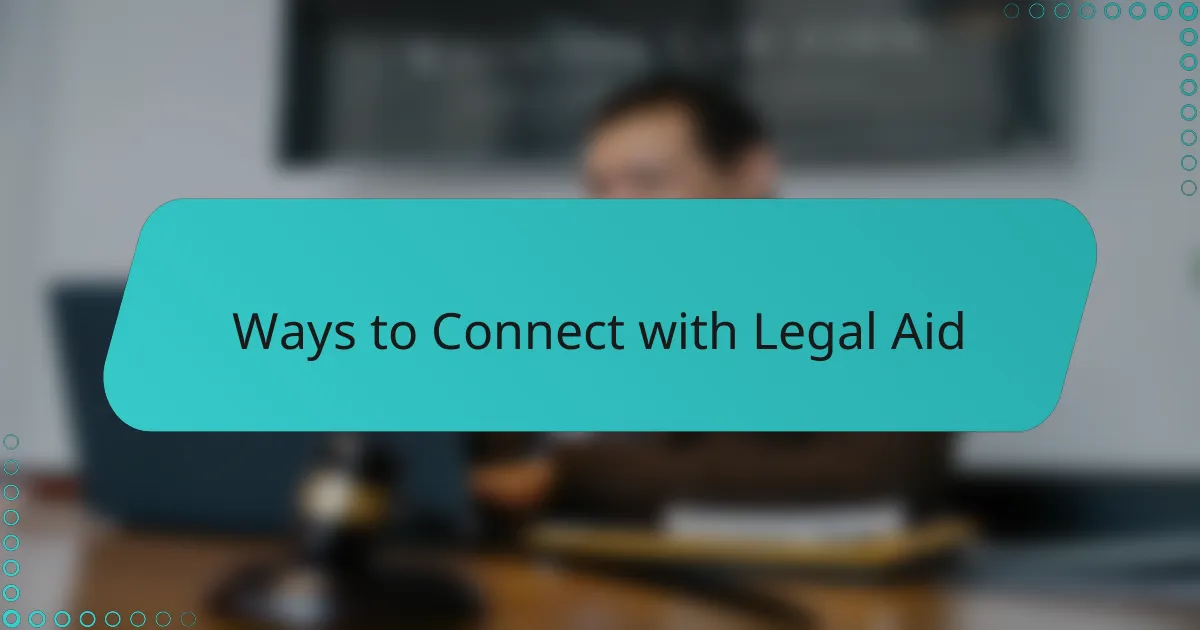
Ways to Connect with Legal Aid
Reaching out to a local legal aid society often starts with something as simple as a phone call or an online inquiry. From my own experience, these initial moments can feel a bit intimidating, but the warmth and patience I encountered quickly eased any apprehension. Have you ever been surprised by how a friendly voice can open doors you thought were closed?
Another way I’ve connected with legal aid is through community events or workshops they host. Attending these gatherings gave me a chance to meet advocates face-to-face, ask questions, and even hear stories from others who found support there. It’s amazing how much more accessible legal help feels when you see the people behind the service.
Sometimes, just walking into a local legal aid office made all the difference for me and those I know. There’s something powerful about sitting down in a welcoming space dedicated to justice and being reminded that you’re not alone in your struggles. Have you ever experienced that sense of hope that springs up in unexpected places?
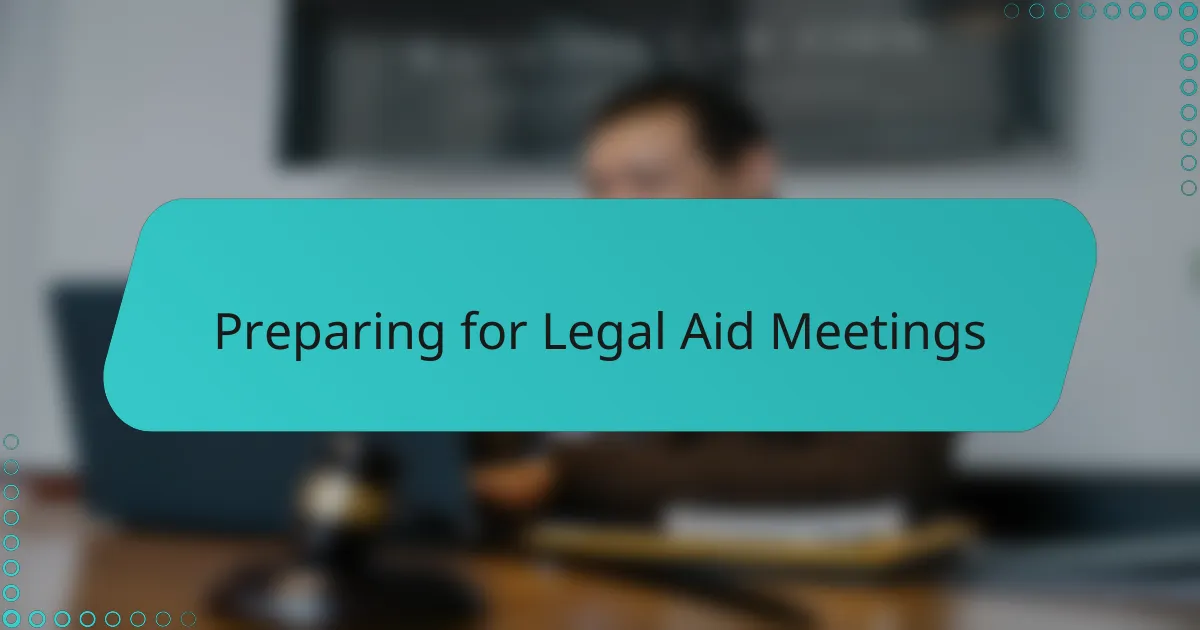
Preparing for Legal Aid Meetings
Preparing for legal aid meetings means gathering all the essential documents beforehand—a habit I quickly learned makes a world of difference. When I first showed up with a jumble of papers, the advocate’s patience was remarkable, but having organized files later made our conversations flow so much easier. Have you ever noticed how being prepared helps you feel more confident and respected right from the start?
I also make it a point to jot down my main questions and concerns ahead of time. This small step helped me stay focused during meetings and ensured I didn’t lose track of what truly mattered to me. It’s incredible how writing things down clarifies your thoughts, making the whole legal process seem less overwhelming.
Sometimes, I wonder if others hesitate to prepare because they’re unsure what information is relevant. From my experience, advocates appreciate when clients come ready to share key details, even if they seem small. That kind of collaboration sets the stage for meaningful progress and, honestly, makes you feel like an active partner rather than just a passive recipient.
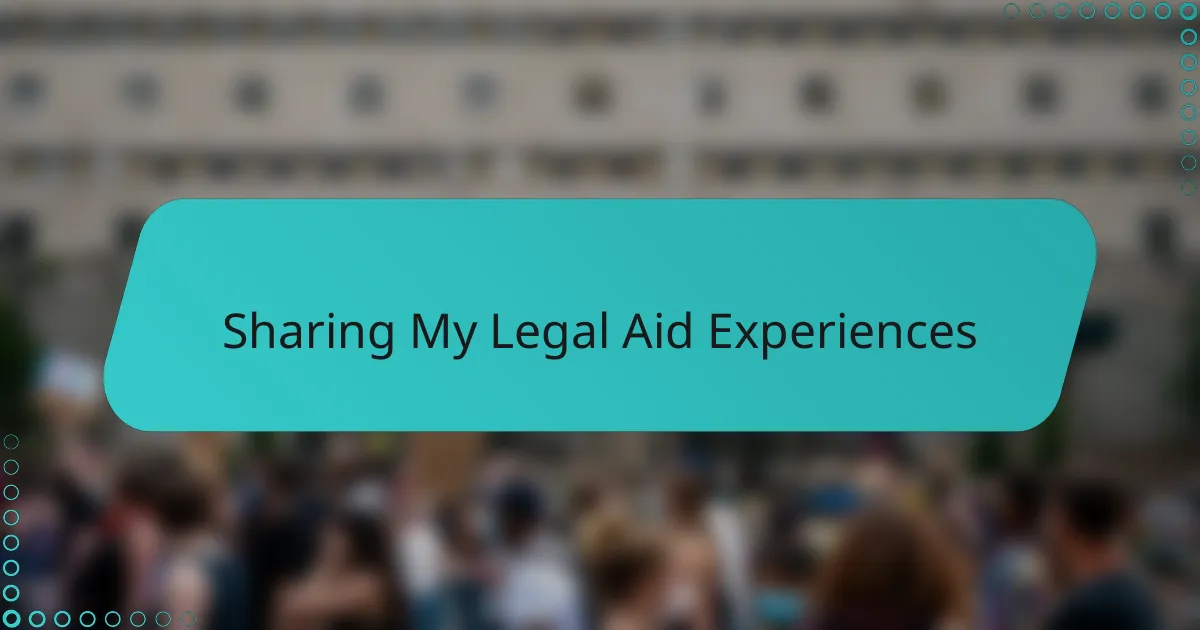
Sharing My Legal Aid Experiences
When I share my experiences with legal aid societies, I often think about the first client I supported—a single mother overwhelmed by eviction notices. Walking alongside her through that legal maze made me realize how crucial it is to not just offer services but to share stories that spotlight these lifelines in our communities. Have you ever noticed how hearing a real story brings abstract concepts like “legal aid” down to earth?
I’ve also found that discussing my journey helps break the stigma some people feel about seeking help. Once, a neighbor confessed they thought legal aid was only for the “desperate,” until I explained how everyone deserves access to justice, no matter their background. Isn’t it surprising how a simple conversation can shift perspectives and encourage someone to take that first step toward getting help?
Sometimes, sharing isn’t just about encouraging others—it’s a way for me to reflect on the impact these societies have had on my own understanding of justice. Each time I recount moments of victory and struggle, I’m reminded why this work matters so deeply. Have you ever felt that revisiting your experiences can strengthen your commitment to a cause? For me, that’s exactly what happens when I share my legal aid stories.
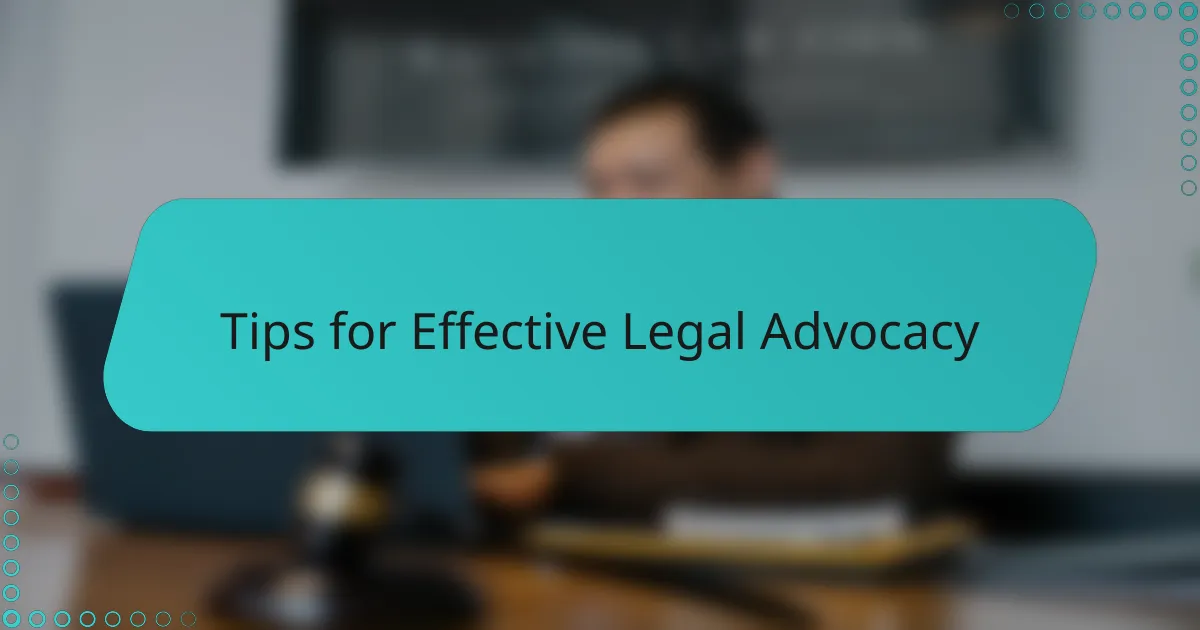
Tips for Effective Legal Advocacy
When I think about effective legal advocacy, clear communication always comes to mind first. Have you noticed how much a simple explanation can change the way someone feels about their case? From my experience, breaking down complex legal jargon into everyday language not only builds trust but empowers clients to be active participants in their own journey.
Another tip I’ve learned is the importance of listening deeply. It’s easy to focus only on the facts, but I’ve found that truly hearing a client’s story reveals the heart of the matter—and sometimes, what’s at stake goes beyond the legal issue itself. Isn’t it powerful how empathy can turn a routine meeting into a moment of real connection and motivation?
Lastly, staying organized and prepared has saved me countless headaches. Before any meeting or court date, I make sure all necessary documents and notes are at hand. This not only shows respect for everyone’s time but also creates momentum toward resolution. Have you ever felt the difference that preparedness makes in how confidently you approach a challenge? I certainly have, and it always makes advocacy more effective.
